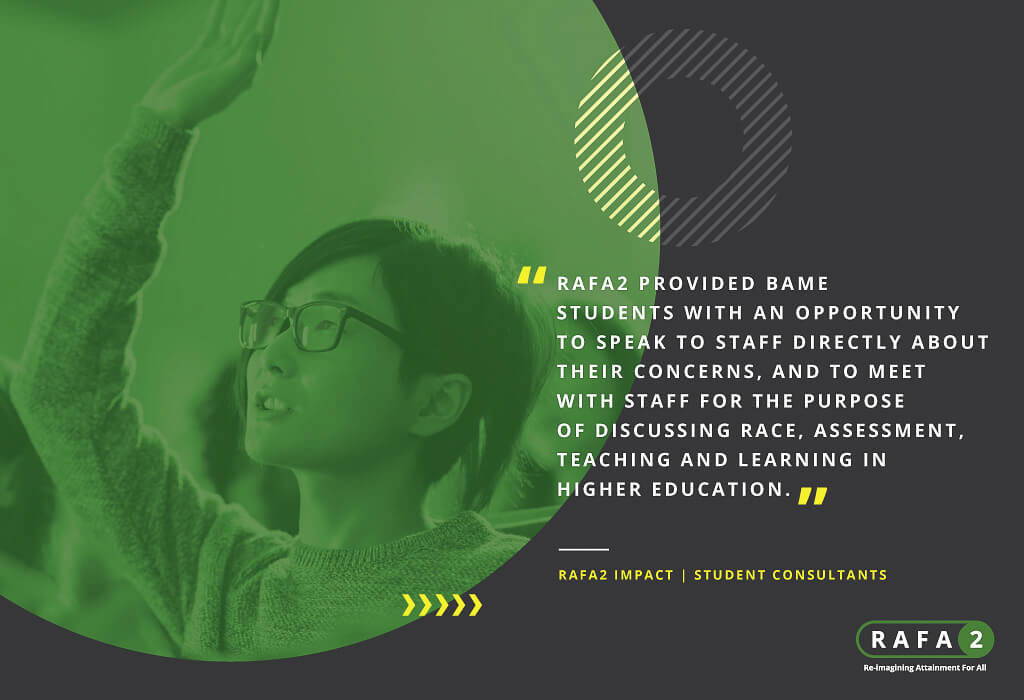About RAFA 2
Methodology

RAFA2 emerted from two previous research enquiries led by the Learning and Teaching Enhancement Unit (LTEU) at the University of Roehampton. The Journeys to Success project and RAFA were both Higher Education Academy (HEA) funded projects which were part of the National Summit Programme.
The project employed appreciative inquiry to examine aspects of the experiences of BAME students, and went on to identify pressure points throughout the student life cycle and mapped opportunities which positively affected attainment outcomes. RAFA built on this further by focusing on transparency in the process of assessment and extending the knowledge base of how the aspirations of all students are formed.
RAFA2’s main objectives were to:
- To enhance processes and behaviours of academic staff and students in relation to assessment
- To provide insight and recommendations into how to address the attainment gap between BAME and white students
RAFA2 utilised four main elements within its enquiry:
- Scrutiny of attainment data by programme
- Intensive and powerful CPD for academic staff
- Recruitment of student consultants to develop resources and lead staff development
- Masterclasses on student aspirations and attainment, led by students
To achieve RAFA’s aims, the project placed student consultants at its centre, underpinning its methodology. Research highlights the need for deeper and wider engagement of students and their representatives in decision-making and the implementation of enhancement initiatives.
Student consultants were allocated specific responsibilities and supported in the co-creation of change. Ashwin et al. (2013) explain that impactful student engagement requires reaching beyond the ‘usual suspects’, and so critically, all student consultants (who self-identified as BAME) developed spaces for collective reflection in partnership with department heads, programme convenors and senior academic staff to make informed judgements.
RAFA2 replicated this approach using mixed methods methodology, such as:
- Appreciative Inquiry
- Participatory and consultative approach
- Student as partners
- Quantitative data on degree attainment, progressions rates and retention statistics
- Qualitative data on BAME students’ perceptions of assessment practices, staff perceptions, focus groups, with case studies from participating students
Students were also involved in encouraging academic staff to recognise their responsibility and to consult on their ideas and design interventions collaboratively with those affected.
The central driver for scaling up RAFA is to transfer a locally successful approach to new contexts in order to close the attainment gap and learn more about student-led change. Through collaborative working, we aimed to monitor whether assumptions about the project were understood and verified before sharing with the sector.
RAFA2 was extended across all 10 academic departments at Roehampton as the model was already known and had been used successfully. At Carshalton College, one department was involved, as only one department offers Higher Education. At Queen Mary University of London (QMUL), the participants were drawn from the schools of Geography, and Politics and International Relations, as the attainment gap is noticeable in these departments, which have a high number of BAME students. Muslim Women students were also considered within these departments, although this was dependent on fluctuations in student numbers.
References
Hall, R., 2010. The work–study relationship: experiences of full‐time university students undertaking part‐time employment. Journal of Education and Work, 23(5), pp.439-449.
Kumar, A., 2013. Formative assessments as pedagogic tools. International Journal of Human Sciences, 10(1), pp.750-759